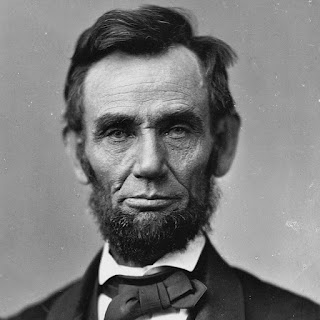- Get link
- X
- Other Apps
Title: Abraham Lincoln: The Legacy of a Visionary Leader
Introduction:
Abraham Lincoln, often hailed as one of America's greatest presidents, was a remarkable figure whose leadership during one of the nation's most tumultuous periods left an indelible mark on its history. Born on February 12, 1809, in a log cabin in Kentucky, Lincoln rose from humble beginnings to become the 16th President of the United States. Throughout his presidency, Lincoln navigated the challenges of the Civil War and fought tirelessly to preserve the Union while championing the cause of emancipation. This essay delves into the life, accomplishments, and enduring legacy of Abraham Lincoln.
I. Early Life and Political Journey
Abraham Lincoln's early years were marked by hardship and self-education. Raised in a modest farming family, he faced countless obstacles but possessed an unwavering commitment to learning. Lincoln's insatiable appetite for knowledge led him to study law and enter the world of politics. His involvement with the Whig Party and subsequent election to the Illinois State Legislature in 1834 marked the beginning of his political career. Over the years, Lincoln's steadfast dedication to the principles of justice, equality, and freedom earned him respect and recognition among his peers.
II. Presidency and the Civil War
In 1860, Lincoln's election as President triggered a chain of events that would shape the course of American history. As the country teetered on the brink of division, Lincoln assumed office with the daunting task of preserving the Union. The outbreak of the Civil War in 1861 presented an immense challenge, testing Lincoln's leadership abilities and resolve. His steady hand and astute decision-making guided the Union through the darkest hours of the war, ultimately leading to the defeat of the Confederacy and the restoration of the United States.
III. Emancipation Proclamation and the Fight for Freedom
One of Lincoln's most transformative acts as President was the issuance of the Emancipation Proclamation in 1862. This landmark executive order declared that all slaves in Confederate-held territory were to be set free. Although its immediate impact was limited, the Emancipation Proclamation laid the groundwork for the eventual abolition of slavery in the United States. Lincoln's unwavering commitment to emancipation demonstrated his moral conviction and belief in the fundamental rights and equality of all individuals.
IV. Legacy and Impact
Abraham Lincoln's legacy extends far beyond his presidency and the Civil War. His visionary leadership and unwavering commitment to justice and equality continue to inspire generations. Lincoln's tragic assassination in 1865 cut short his life but solidified his place in American history as a symbol of unity, resilience, and integrity. The principles he espoused, including his belief in the importance of preserving the Union and fighting for the rights of the oppressed, continue to resonate in the collective consciousness of the nation.
Conclusion:
Abraham Lincoln's life and presidency were marked by extraordinary challenges and remarkable achievements. From his modest beginnings to his transformative presidency, Lincoln exemplified the qualities of a visionary leader. His resolute dedication to preserving the Union and championing the cause of emancipation during the Civil War established him as an iconic figure in American history. Today, Lincoln's enduring legacy serves as a beacon of hope and inspiration, reminding us of the transformative power of leadership and the pursuit of justice.
Here are some simple questions and answers about Abraham Lincoln:
Q: When and where was Abraham Lincoln born?
A: Abraham Lincoln was born on February 12, 1809, in a log cabin in Hodgenville, Kentucky.
Q: Which number president was Abraham Lincoln?
A: Abraham Lincoln was the 16th President of the United States.
Q: What political party did Lincoln belong to?
A: Abraham Lincoln belonged to the Republican Party.
Q: What major event occurred during Lincoln's presidency?
A: The major event that occurred during Lincoln's presidency was the American Civil War, which lasted from 1861 to 1865.
Q: What was Lincoln's famous speech called?
A: Lincoln's famous speech is known as the Gettysburg Address, delivered on November 19, 1863, during the American Civil War.
Q: What did Lincoln do to address the issue of slavery?
A: Lincoln issued the Emancipation Proclamation in 1862, declaring that all slaves in Confederate-held territory were to be set free. He also pushed for the passage of the 13th Amendment, which abolished slavery in the United States.
Q: How did Abraham Lincoln's presidency end?
A: Abraham Lincoln's presidency ended tragically when he was assassinated on April 14, 1865, by John Wilkes Booth at Ford's Theatre in Washington, D.C.
Q: What is Abraham Lincoln's enduring legacy?
A: Abraham Lincoln's enduring legacy lies in his leadership during the Civil War, his efforts to preserve the Union, and his commitment to emancipation. He is remembered as a symbol of unity, resilience, and the fight for equality.
Q: Which monument in Washington, D.C., honors Abraham Lincoln?
A: The Lincoln Memorial in Washington, D.C., is a prominent monument dedicated to Abraham Lincoln. It features a larger-than-life statue of Lincoln seated in contemplation.
Q: What is Abraham Lincoln's nickname?
A: Abraham Lincoln is often referred to as "Honest Abe," a nickname that highlights his reputation for honesty and integrity.
- Get link
- X
- Other Apps

Comments
Post a Comment